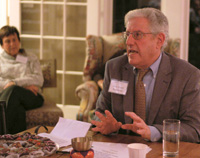By Janis Siegel, JTNews Correspondent
A Hebrew text from 1797, one of the most widely read and influential Jewish books of its time, caught the imagination of one of today’s foremost Jewish scholars because it promoted harmony and the coherence between science, nature, and the Divine.
David Ruderman, a professor of modern Jewish history at the University of Pennsylvania, spoke to packed audiences in Seattle on October 22 and 24 as part of the University of Washington’s annual Stroum Lecture series. In his lectures, “Behind a Best Seller: Kabbalah, Science, and Loving One’s Neighbor in Pinhas Hurwitz’s “˜Sefer ha-Brit,’” Ruderman explained why “Sefer ha-Brit” (“The Book of the Covenant”), written by European kabbalist and entrepreneur Pinchas Hurwitz, was reprinted in 40 editions.
“Isaac Bashevis Singer wrote about the fact that his mother loved this book especially,” Ruderman told JTNews. “He read the Yiddish version. People like [S.Y.] Agnon, Solomon Schechter, and a long list of people have quoted the book. This is the way people got their science. People had it in their homes. This was the kind of book that was “˜parve.’ You could learn your science and still appreciate being a Jew.”
Ruderman said that the book’s second part, which calls for a universal morality, is its most remarkable. It provides a kind of early moral template for uniting disparate groups, both within and outside of Judaism. Hurwitz’s book, he said, contains a sophisticated message he calls “moral cosmopolitanism” that appealed to Jews at a time when the printing press and the scientific revolution were shaping a new intellectual future.
“The work is a scientific encyclopedia written by a kabbalist,” said Ruderman. “It was read by Jews who were enlightened, who were trying to express their secularity, but it was also read by Hassidim, and the opponents of Hassidim. It breaks down all barriers.”
According to Ruderman, “Sefer ha-Brit” includes chapters on astronomy, botany, geology, animals, medicine, the human body, and Creation. Hurwitz, who was only known due to the popularity of this book, wanted Jews to have all of the available scientific knowledge of the time.
“He was an aggressive book dealer,” Ruderman explained. “He goes around the world selling this book. He was born in Vilna, he goes to Germany, he comes to the Netherlands, he’s in Amsterdam, spends a year in The Hague, he goes to London, he goes back across the continent, and he eventually dies in Krakow.”
Ruderman, who is also an ordained Reform rabbi, noted that medicine and the choice to become a doctor was always accepted and encouraged in Jewish culture throughout history, as it was during Hurwitz’s time.
“Many Jews, from a very early period of time, became doctors, and doctors were approved of as a very important dimension of the Jewish tradition,” said Ruderman. “Medicine was not looked down upon. There were so many Jewish doctors, and this continues in Northern Europe in the Middle Ages.”
However, in the 19th and 20th century, he said, science and traditional Judaism underwent a partial split.
“I think it had to do with the breakdown of the traditional community,” he said. “During the scientific revolution, Jews become aware, like others, of this world, and they responded. Jews were assimilating and leaving the Jewish fold, but the connection wasn’t broken.”
Additionally, the growing acceptance of Jews in academia further encouraged the trend of Jews migrating toward the
sciences and away from traditional
influences.
“And then in the Early Modern period there was an explosion, because universities, for the first time, opened their doors to Jews, and many Jews go to the university to study medicine.”
Ruderman, who is the Joseph Meyerhoff Professor of Modern Jewish History and the Ella Darivoff Director of the Herbert D. Katz Center for Advanced Judaic Studies at UPenn, originally went to rabbinical school to follow a family legacy of rabbis, but instead, excelled in the academic world.
He taught at Yale for 11 years and also spent six years at the University of Maryland.
Ruderman is a winner of two National Jewish Book Awards for his work in Jewish history, mysticism, spirituality, and science, and was awarded his most recent NJB award in 2011 for his book “Early Modern Jewry: A New Cultural History” (Princeton, 2010). He received the National Foundation for Jewish Culture’s lifetime achievement award in 2001 for his work in Jewish history.
